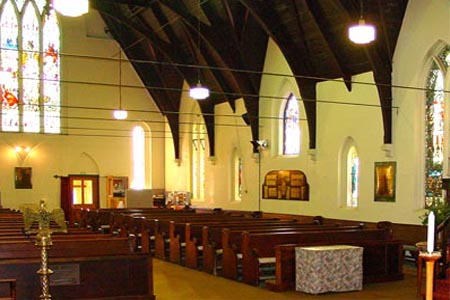| |
 |
 |
 |
| Comment on this report, or find other reports. |
 |
| Our Mystery Worshippers are volunteers who warm church pews for us around the world. If you'd like to become a Mystery Worshipper, start here. |
 |
| Find out how to reproduce this report in your church magazine or website. |
|
|
| 2129: All Saints,
Dunedin, New Zealand |
 |
 |
 |
Mystery
Worshipper: Cantate Domino.
The church:
All Saints,
Dunedin, New Zealand.
Denomination:
Anglican
Church in Aotearoa, New Zealand and Polynesia, Diocese
of Dunedin.
The building:
All Saints is Dunedinís oldest church building (a distinction
that some local Presbyterian churches contest) and is a very
cute brick Gothic structure. It has the atmosphere of a simple
English parish church. Inside are standard pews, memorials to
the fallen of the Great War, and much attractive stained glass,
including windows depicting native birds. Everything from the
organ to the lectern and the carpets were slightly shabby but
very charming.
The church:
It is a busy parish, with a baby and toddler playgroup, a women's
group, and sundry other parish groups. Overall the parish is
Anglo-Catholic in tradition, but welcomes women priests.
The neighbourhood:
Dunedin is the second largest city on South Island and sits
in the area of an extinct volcano. There are some splendid views
of the harbour and hills. The area where the church is located
is mostly residential, but immediately behind All Saints is
Selwyn College of the University of Otago and other picturesque
university buildings. Selwyn, named in honour of the first and
only bishop of New Zealand, started life as an Anglican theological
college but is now a general residential college. The area bursts
into life during the university terms and there are many pubs,
bars, coffee shops and clubs in the area.
The cast:
The Revd Esther Clarke-Prebble presided and preached.
The date & time:
Waitangi Day, Fifth Sunday in Ordinary Time, 6 February 2011,
8.30am.
What was the name of the
service?
Eucharist (Book of Common Prayer).
How full was the building?
Six people, including your Mystery Worshipper. The small congregation
sat in the choir stalls.
Did anyone welcome you personally?
A member of the congregation smiled and handed me the order
of service.
Was your pew comfortable?
One of the choir stalls in the sanctuary. It had a cushion and
was fairly comfortable.
How would you describe the pre-service
atmosphere?
Extremely lively, as the priestís little son was present in
the transept and was making a lot of noise! This continued throughout
the service.
What were the exact opening words of the
service?
"Good morning."
What books did the congregation use during the
service?
A printed order of service from the 1928 Book of Common
Prayer.
What musical instruments were played?
None.
Did anything distract you?
The little boy was loud and in a very bad mood! At one point
the priest broke off her sermon to explain that if anyone was
wondering who had brought the disruptive child to church, she
was the culprit!
Was the worship stiff-upper-lip, happy clappy, or
what?
Very restrained and in keeping with the restrained beauty of
the Prayer Book. The priest genuflected to the consecrated elements,
but otherwise the service continued with little sense of ritual.
Exactly how long was the sermon?
12 minutes.
On a scale of 1-10, how
good was the preacher?
7 – The preacher herself acknowledged that the readings
from the lectionary were quite disparate and hard to pull together.
She nonetheless attempted to do so. I thought she would have
been better to pick just one theme and try to develop it.
In a nutshell, what was
the sermon about?
Mrs Clarke-Prebble related Waitangi Day (a major national holiday
commemorating the signing of the Treaty of Waitangi, New Zealand's
founding document) and the centenary of the Anglican Womenís
organisation.
Which part of the service
was like being in heaven?
Small congregations with a Prayer Book service are always touching.
It is very moving to think that congregations for centuries
now have been gathering all over the globe and communicating
to each other with this language.
And which part was like being in... er... the other place?
The priest struck me as a lovely person and she made reference
to her commitment to cultural plurality, which is commendable
and especially important in New Zealand. But was it really necessary
to refuse to read out the gender-specific words in the Prayer
Book? You wouldnít muck around with Shakespeare, so why do it
to a text of similar beauty, age and cultural significance?
What happened when you hung around after the service looking lost?
I engaged in friendly conversation with the priest and some
members of the congregation.
How would you describe the after-service
coffee?
None was on offer.
How would you feel about making this church your regular (where 10 = ecstatic, 0 = terminal)?
10 – It was overall a lovely service.
Did the service make you feel glad to be a
Christian?
Yes.
What one thing will you remember about all this in seven days' time?
the opportunity for quiet contemplation always to be found in a BCP said service. |
|
|
 |
 |
 |
| We rely on voluntary donations to stay online. If you're a regular visitor to Ship of Fools, please consider supporting us. |
 |
 |
 |
| The Mystery Pilgrim |
 |
| One of our most seasoned reporters makes the Camino pilgrimage to Santiago de Compostela in Spain. Read here. |
 |
 |
 |
| London churches |
 |
| Read reports from 70 London churches, visited by a small army of Mystery Worshippers on one single Sunday. Read here. |
| |
|
|
|
|


